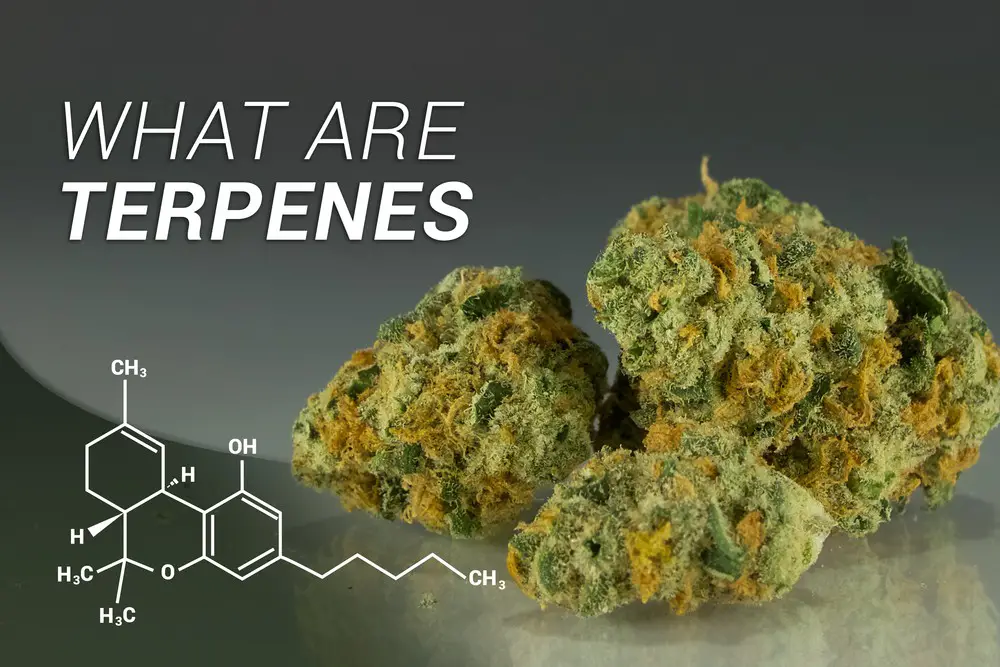As a BetterHelp affiliate, we receive compensation from BetterHelp if you purchase products or services through the links provided
Anxiety is a common mental health disorder that affects millions of individuals worldwide. One lesser-known yet promising aid for anxiety relief is the use of terpenes. Terpenes are aromatic compounds found in many plants, including cannabis, that are responsible for their unique scents and flavors. Due to their potential therapeutic properties, these compounds have been the subject of growing interest and research.
In addition to providing cannabis with its distinct aroma, terpenes play a crucial role in modulating the overall effects of cannabinoids, such as THC and CBD. By understanding the specific terpenes that can help alleviate anxiety symptoms, it’s possible to harness their potential benefits and reduce the associated distress. Exploring various terpenes, their individual effects, and their interactions with other compounds might pave the way toward more personalized and effective anxiety remedies.
Key Takeaways
- Terpenes are aromatic compounds with potential therapeutic properties, including anxiety relief.
- Interaction between terpenes and cannabinoids can enhance their overall effects.
- Studying various terpenes may lead to personalized and effective anxiety treatments.
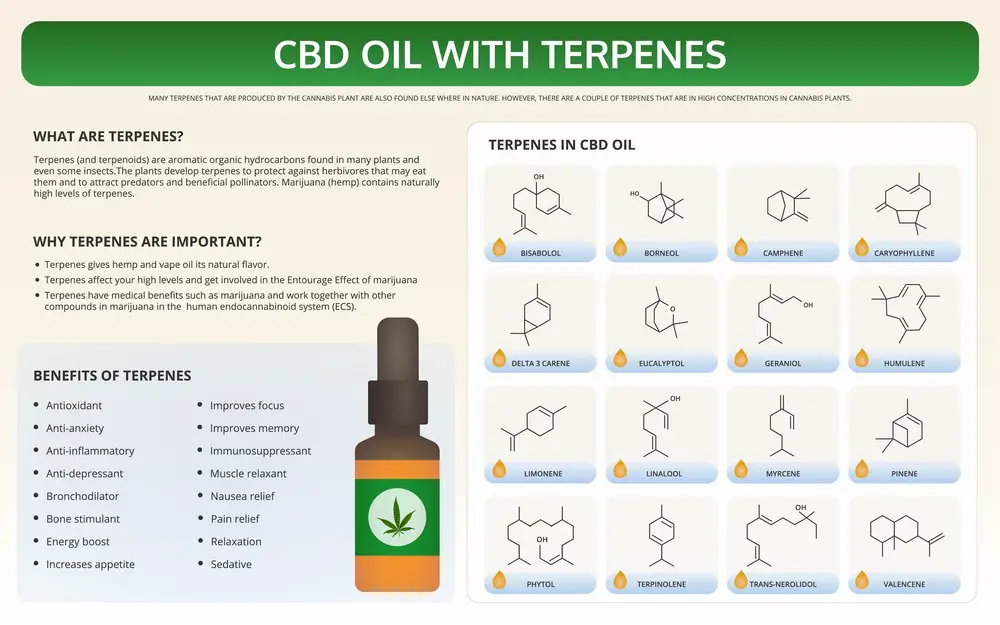
Understanding Terpenes
Terpenes are aromatic compounds found in plants, including cannabis. They are responsible for the unique scents and flavors of different strains and play a crucial role in the plant’s interactions with the environment. These phytochemicals have various biological activities and can influence human health and well-being.
There are over 200 identified terpenes in cannabis plants, each with a unique profile and potential health benefits. Some common terpenes in cannabis are myrcene, limonene, and pinene. Researchers have been studying these compounds for their potential therapeutic effects on various conditions, including anxiety.
Terpenes work in synergy with other cannabis compounds, such as cannabinoids, to create a phenomenon known as the entourage effect. This means that the combined effect of these compounds is greater than the sum of their individual effects. This entourage effect is particularly relevant when considering the role of terpenes in modulating anxiety.
In recent years, numerous studies have explored the anxiolytic properties of various terpenes. For example, limonene has shown promise in reducing anxiety symptoms due to its interaction with serotonergic and dopamine systems in the brain. Similarly, other terpenes, such as linalool and caryophyllene, have also exhibited potential anxiolytic effects.
Many factors can influence the concentration and composition of terpenes in cannabis plants, including genetics, environmental conditions, and cultivation practices. These factors contribute to the unique terpene profile of each cannabis strain, which may offer distinct therapeutic benefits.
In conclusion, understanding terpenes is essential for selecting and utilizing cannabis strains to treat anxiety. Further research is needed to fully comprehend the intricate relationship between terpenes and their impact on mood, cognition, and overall well-being.
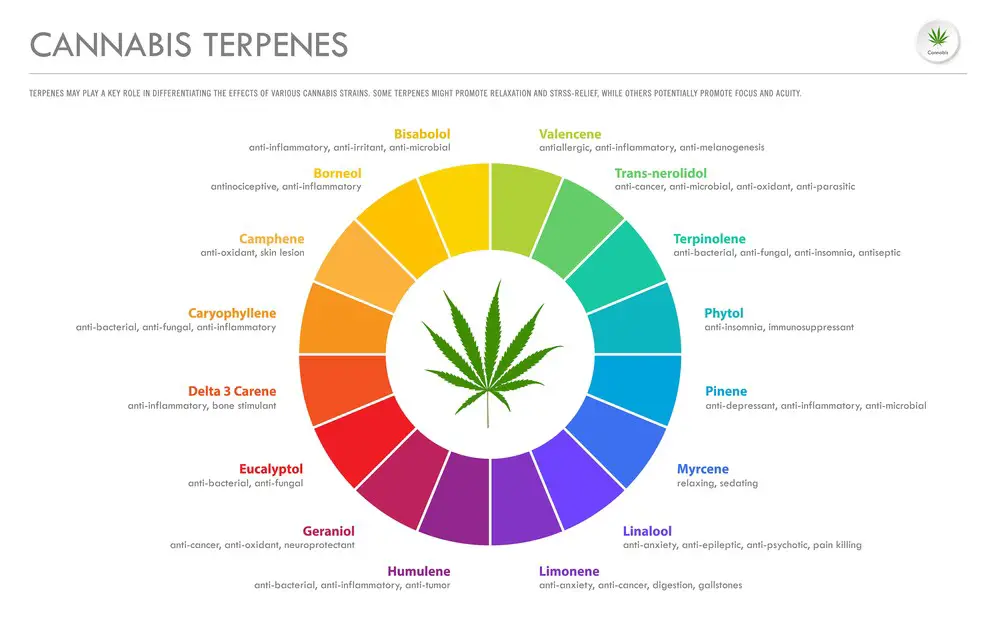
Role of Terpenes in Anxiety
Terpenes play a significant role in managing anxiety and anxiety disorders. These natural compounds, found in plants such as cannabis and aromatic herbs, contribute to the overall effect of a plant on an individual’s mood and relaxation. They help induce a calming effect on the nervous system, supporting and reducing anxiety levels.
The interaction between terpenes and cannabinoids such as CBD and THC in the human body can enhance the therapeutic benefits of each compound. This synergy, known as the entourage effect, aids in modulating the overall impact of the plant’s compounds, reducing undesirable side effects while promoting relaxation and a calm state of mind.
Various terpenes have been identified to possess anxiolytic properties, which can be beneficial in managing anxiety symptoms. Some of the well-known terpenes for anxiety relief include:
- Linalool, commonly found in lavender, is known for its calming and stress-relieving effects. This terpene has been used in aromatherapy to promote relaxation and improve sleep quality.
- Myrcene, found in hops and mango, is another terpene that exhibits a soothing effect. It is known to help ease physical tension and promote a sense of calm in the body.
- Limonene, found in citrus fruits, is a terpene known for its uplifting and mood-enhancing properties. While not directly linked to relaxation, limonene can help to alleviate anxiety by improving overall mood.
Incorporating terpenes into a wellness routine through essential oils, aromatherapy, or consuming plants that contain these compounds can aid in managing anxiety. However, consulting with a healthcare professional before using terpenes as a complementary therapy for anxiety disorders is essential, as individual responses and underlying conditions may vary.
Most Effective Terpenes for Anxiety
Limonene
Limonene is a prominent terpene found primarily in citrus fruits. It provides a fresh and uplifting citrus aroma. Research suggests that limonene may help reduce anxiety and stress levels. This terpene is believed to enhance mood and promote relaxation, potentially benefiting individuals experiencing anxiety.
Caryophyllene
Caryophyllene, a terpene found in black pepper, is known for its distinctive spicy and earthy aroma. Studies have shown that caryophyllene holds the potential to reduce anxiety and depression. It is thought to interact with the body’s endocannabinoid system to produce calming effects, helping with anxiety management.
Myrcene
Myrcene is a prevalent terpene in various plants, including pine and cannabis. It carries a musky, earthy scent. Myrcene has been documented to possess sedative properties, which may be helpful for anxiety sufferers. Its calming effects work to alleviate tension and stress, allowing for a more relaxed state of mind.
Linalool
Linalool, primarily in lavender, is a terpene known for its calming and soothing properties. Its gentle floral scent is widely used in aromatherapy to induce relaxation and promote sleep. Studies suggest that linalool may help alleviate anxiety symptoms and provide a sense of tranquility.
Pinene
Pinene is a terpene commonly found in pine trees, known for its sharp and refreshing aroma. Research indicates that pinene may possess anti-anxiety effects, helping reduce stress and anxiety. This terpene is thought to contribute to mental clarity and focus while also providing calming benefits.
Beta-Caryophyllene
Beta-caryophyllene is a unique terpene found in various plants, including cannabis and black pepper. It is known for its spicy aroma and ability to interact with the body’s endocannabinoid system. Studies have shown that beta-caryophyllene can aid in reducing anxiety levels, providing relief through its calming properties.
Guaiol
Guaiol is a lesser-known terpene with a sweet, floral scent, predominantly found in the guaiacum plant. Although limited research is available on guaiol, preliminary studies suggest it may have potential anti-anxiety properties. This terpene’s calming effects can help alleviate stress and promote a general sense of relaxation.
How Terpenes and Cannabinoids Interact
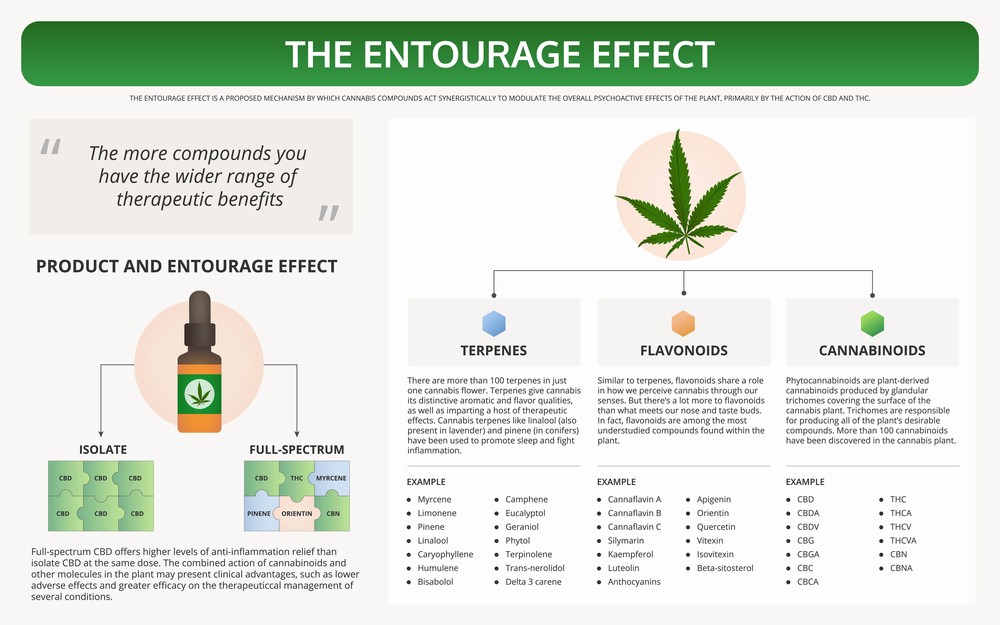
The Entourage Effect
The entourage effect describes the synergistic interaction between cannabinoids, terpenes, and other compounds found in the cannabis plant. This interaction is believed to enhance the therapeutic benefits of individual compounds, with terpenes playing a significant role in modulating the effects of cannabinoids. For example, specific terpenes like myrcene can enhance the sedative properties of certain cannabinoids, while limonene may help improve focus and elevate mood.
It’s essential to acknowledge that many factors influence the entourage effect, such as the individual’s unique endocannabinoid system and the specific combination of cannabinoids and terpenes in a given strain or product.
Endocannabinoid System

The human body contains an endocannabinoid system (ECS) that plays a vital role in maintaining homeostasis – balance and stability. The ECS comprises cannabinoid receptors (CB1 and CB2), endogenous cannabinoids, and enzymes responsible for synthesizing and breaking down these cannabinoids.
CB2 receptors are mostly found in the immune system cells and regulate inflammation, pain, and immune response. Cannabinoids like THC and CBD interact with the CB2 receptors to produce various effects. Terpenes are also known to interact with the ECS and influence the way cannabinoids function.
A CB2 receptor agonist is a compound that binds to the CB2 receptor and activates its functionality. Research suggests that some terpenes can behave as CB2 receptor agonists, indirectly regulating the activity of other cannabinoids like THC and CBD in the ECS.
In summary, the interaction between cannabinoids and terpenes in the context of the entourage effect and endocannabinoid system is complex and multifaceted. Understanding these interactions can help individuals select the right combination of terpenes and cannabinoids for therapeutic use, specifically in anxiety.
Therapeutic Benefits of Terpenes Beyond Anxiety
Terpenes, the organic compounds responsible for the aroma and flavor of plants, are also known for their numerous therapeutic properties. These compounds extend far beyond their anxiolytic effects and may help with various health concerns.
For individuals struggling with depression, certain terpenes can act as natural antidepressants. Studies have found that terpenes like limonene and linalool can positively influence mood and help combat depression. These compounds interact with neurotransmitters in the brain, potentially improving emotional well-being.
When it comes to stress relief, many terpenes can also be beneficial. For example, myrcene is known for its soothing effects, making it a popular choice for alleviating stress. Additionally, caryophyllene, a terpene found in cloves and black pepper, may help regulate the body’s stress response by interacting with the endocannabinoid system.
Inflammation, a common source of discomfort and pain, can also be addressed with the help of terpenes. Some terpenes, like alpha-pinene and beta-caryophyllene, possess anti-inflammatory properties, which may contribute to reducing inflammation in the body. By targeting pathways that cause inflammation, these terpenes could support the body’s natural healing process.
The analgesic properties of certain terpenes further extend their health benefits by providing pain relief. Terpenes such as caryophyllene and linalool have displayed potential as natural analgesics, making them viable alternatives to conventional pain medications. These compounds are thought to interact with pain receptors, offering a gentler and more holistic approach to pain management.
Finally, terpenes like myrcene and linalool can assist those in need of a sedative to promote relaxation and sleep. These terpenes may possess mild sedative effects, helping to calm the mind and prepare the body for restful sleep. Incorporating terpenes into sleep routines could be a natural option for those seeking healthier alternatives to sleep aids.
In summary, terpenes provide various therapeutic benefits beyond anxiety relief. Their potential to address issues such as depression, stress, inflammation, pain, and sleep disturbances showcases the versatility and potential of these natural compounds in promoting overall well-being.
Effect of Terpenes on Cognitive Function
Terpenes are natural compounds in plants, including cannabis, contributing to their aroma and flavor. They have been gaining attention because of their potential therapeutic benefits, especially concerning anxiety and cognitive function.
Some terpenes possess anxiolytic properties, meaning they can reduce anxiety. This can directly affect cognitive function since the mind can perform at its best when free from the constraints of anxiety. Therefore, it is worth exploring the potential benefits of terpenes to support mental clarity and enhance cognitive processes.
Linalool, for example, is a terpene known to have gentle calming effects. Research suggests that linalool may help alleviate anxiety, making it easier for people to concentrate and absorb new information. Moreover, its sedative properties can promote a good night’s sleep, resulting in optimal cognitive performance the following day.
Another terpene, limonene, has been shown to uplift one’s mood and increase motivation. This can significantly impact cognitive function; a positive mental state can encourage better problem-solving skills and heightened overall cognitive ability. Its invigorating scent is also thought to stimulate attentiveness and mental alertness.
Beta-caryophyllene is another terpene of interest, with research indicating that it may reduce anxiety and boost cognitive function. Studies suggest that it may help support focus and mental clarity, especially for those facing anxiety disorders.
In conclusion, terpenes provide an intriguing avenue of research regarding cognitive function and mental health. The anxiolytic and mood-enhancing effects of certain terpenes, such as linalool, limonene, and beta-caryophyllene, can improve cognitive performance, allowing the mind to perform at its best.
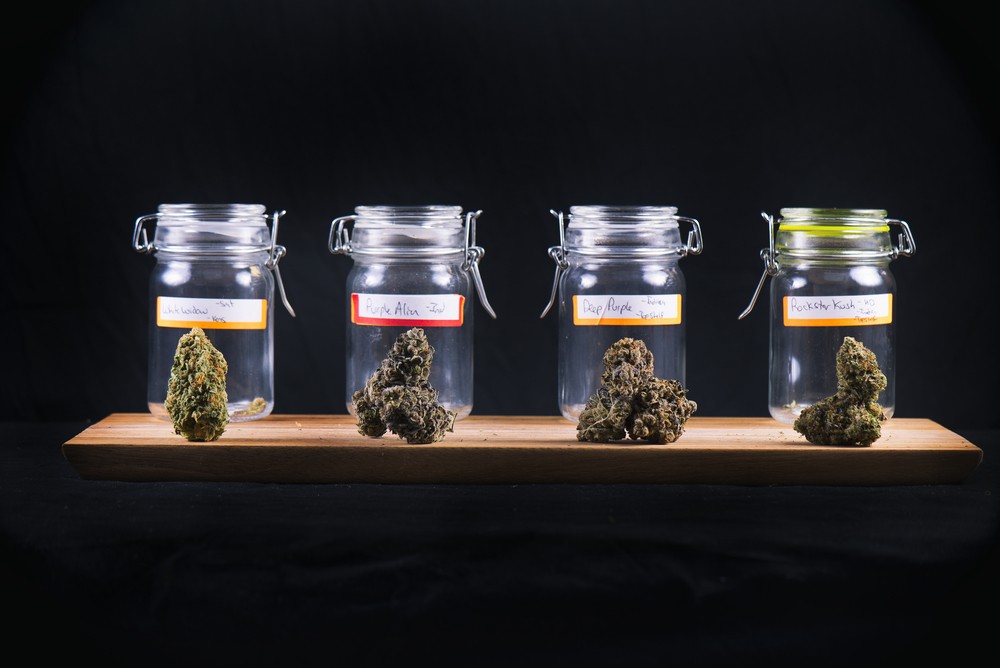
Terpene-Enriched Cannabis Strains
Cannatonic
Cannatonic is a well-known cannabis strain for its high CBD and low THC content. It is rich in myrcene, a powerful anti-anxiety, and anti-inflammatory terpene. Cannatonic is known to relieve anxiety without making the user feel overly sedated. Its balanced ratio of CBD to THC provides a more relaxed and uplifting experience.
Harlequin
Harlequin is another popular strain for anxiety relief due to its high levels of CBD and a 5:2 ratio of CBD to THC. This strain is also abundant in the terpenes pinene and caryophyllene, known for their anti-anxiety and anti-inflammatory properties. Harlequin provides a focused and alert effect, making it a suitable option for daytime use.
Bubba Kush
Bubba Kush is an Indica-dominant strain with moderate levels of THC and traces of CBD. It is rich in the terpenes caryophyllene and limonene. These terpenes provide anxiety relief and contribute to an overall relaxed state. Bubba Kush is known for its earthy flavors and calming effects, often used as a sleep aid or for pain relief.
White Widow
White Widow is a balanced hybrid strain known for its potent effects and unique terpene profile. It contains high levels of limonene, myrcene, and caryophyllene, all of which are noted for their anxiety-reducing properties. White Widow offers a clear-headed and relaxed high, making it suitable for social situations without increasing anxiety.
Blueberry Cheesecake
Blueberry Cheesecake is an Indica-dominant hybrid strain with a distinctive fruity aroma. It is rich in myrcene, caryophyllene, and pinene. These terpenes work synergistically to provide anxiety relief and promote relaxation. Blueberry Cheesecake is a flavorful option that can be enjoyed for its calming effects without inducing heavy sedation.
Potential Side Effects of Terpenes
Terpenes, while providing numerous therapeutic benefits for anxiety and stress, may also have some potential side effects. Generally, terpenes are considered safe when ingested from natural sources or used as directed in therapeutic products. However, some users might experience side effects depending on their sensitivities and the concentration of terpenes in a specific product.
One common side effect associated with the use of some terpenes is paranoia. In particular, higher concentrations of certain terpenes, like myrcene and limonene, can potentially cause mild to moderate paranoia in sensitive individuals. It is crucial to start with low doses and gradually increase the dosage while monitoring one’s reactions to minimize this risk.
Terpenes can also cause allergic reactions in some individuals. These reactions can range from mild skin irritations to more severe respiratory distress. It is essential to consult with a healthcare professional before starting terpene-based treatments, especially if you have a history of allergies or respiratory issues.
In addition, some terpenes can cause dizziness, lightheadedness, or headaches when used in excess or conjunction with other substances, such as alcohol. It is essential to follow the recommended dosage and method of ingestion to avoid these uncomfortable side effects.
Furthermore, while most terpenes are non-toxic, improper usage or consumption of terpenes in large amounts can lead to toxicity. It is vital to adhere to the recommended dosage guidelines and consult with a healthcare professional if experiencing adverse effects.
Lastly, terpenes can interact with medications, enhancing or inhibiting their effects. Before using terpenes alongside prescription or over-the-counter medications, it is crucial to seek the advice of a healthcare professional to ensure safety and prevent unwanted interactions.
In conclusion, while terpenes offer numerous benefits for managing anxiety, they can also result in some potential side effects. Knowing these risks is crucial, starting with low doses and consulting with a healthcare professional before using terpenes for anxiety relief.
Conclusion
In summary, terpenes play a significant role in combating anxiety. Research indicates that certain terpenes possess anxiolytic properties, which can help alleviate anxiety symptoms. The most effective terpenes for anxiety relief include myrcene, limonene, beta-caryophyllene, linalool, and alpha-pinene.
- Myrcene has been known to promote relaxation and help with sleep, making it beneficial for anxiety sufferers.
- Limonene has mood-enhancing effects, which can contribute to a decrease in anxiety levels.
- Beta-caryophyllene interacts with the endocannabinoid system, regulating mood and stress responses.
- Linalool offers calming effects, making it ideal for easing anxiety and promoting relaxation.
- Alpha-pinene may improve cognitive function, helping individuals better cope with anxious thoughts.
One should consider incorporating these terpenes into their wellness routine, whether through essential oil aromatherapy, supplements, or cannabis products containing these specific terpenes. It is essential to consult with a healthcare professional before beginning any new treatment for anxiety, as individual needs and reactions may vary.
Frequently Asked Questions

What are the top calming terpenes?
Linalool, myrcene, and caryophyllene are some of the top calming terpenes. These terpenes have been shown to promote relaxation, reduce stress, and alleviate anxiety symptoms. They are commonly found in various plants, including lavender, hops, and cannabis.
Which terpenes are best for stress relief?
Linalool, myrcene, and limonene are effective terpenes for stress relief. Linalool has a calming effect on the nervous system and may help reduce stress levels. Myrcene is known for its sedative properties, which can help induce relaxation. Limonene has an uplifting and invigorating effect, helping to combat stress and promote a positive mood.
How do terpenes aid in reducing anxiety?
Terpenes aid in reducing anxiety by interacting with various receptors and neurotransmitters in the brain. They can influence the release of serotonin and other neurotransmitters, modulate the activity of the GABA system, and interact with the endocannabinoid system, all of which can contribute to anxiety relief.
Which terpenes promote relaxation and sleep?
Linalool, myrcene, and caryophyllene are terpenes that promote relaxation and sleep. Linalool creates a calming atmosphere, myrcene induces relaxation and has sedative effects, and caryophyllene has been shown to interact with the endocannabinoid system, which plays a role in regulating sleep.
What terpenes have the most anti-anxiety effects?
Linalool, myrcene, and caryophyllene show the most significant anti-anxiety effects. They work by modulating neurotransmitter release, influencing the endocannabinoid system, and interacting with the GABA system, which can help alleviate anxiety symptoms.
How can terpenes ease symptoms of PTSD?
Terpenes may help ease symptoms of PTSD by regulating the endocannabinoid system, modulating the release of stress-related neurotransmitters, and influencing the activity of the GABA system. These actions can reduce the severity of PTSD symptoms such as anxiety, stress, and insomnia.
As someone who has struggled with mental health challenges while navigating a difficult custody battle with a narcissistic ex-partner, I know how important it is to prioritize self-care and seek help when needed. I take Lexapro to manage my symptoms and take long daily walks to stay grounded and centered. Despite my ex-partner’s consistent refusal to comply with court orders and allow me communication with my children, I remain committed to fighting for their well-being. I write articles about mental health and narcissism to support and guide others facing similar challenges and raise awareness about the importance of seeking help and support for mental health issues.
- 7 Ideas to Help You Relax and Unwind on a Family Vacation - April 27, 2025
- How Having Cybersecurity Protection Helps You Relax - April 25, 2025
- 8 Reasons Why Spending Time Outside Calms You Down - April 25, 2025
This site contains affiliate links to products. We will receive a commission for purchases made through these links.

